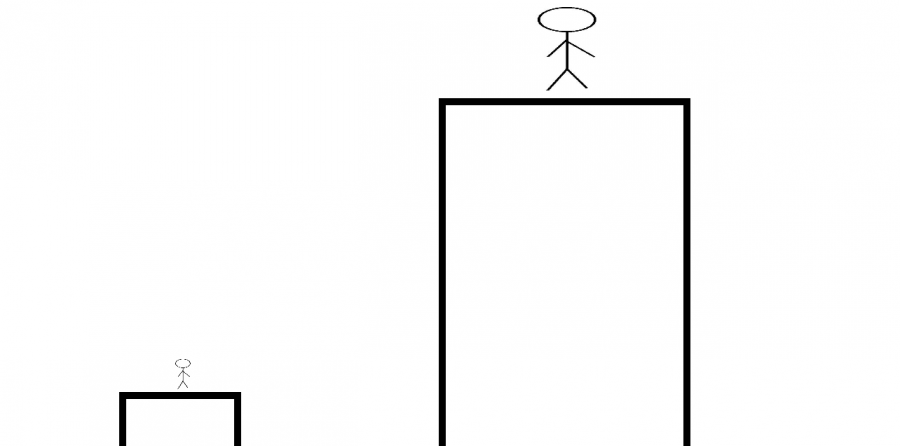The Necessity of Toxicity
How competition hurts society-and why society needs it.
Let’s take a look at a forest. There are a couple of sprouts on the floor. There are already tall trees soaking in the sunlight. So, as the sun shines through what space the leaves of the other trees allow and the sprouts grow on the forest floor, a dilemma arises. There are too many sprouts and too little light. So, the sprouts compete for the light. Every bit of light one sprout gets is a bit of light that the other sprouts don’t get. In the end, some sprouts live and grow, some sprouts never grow, and some sprouts die.
Let’s take a look at a different situation. It’s the same forest and the same sprouts, but let’s say the sprouts suddenly develop a conscience and say, “Let’s not compete.” So, instead of competing, they all start growing at the same rate, taking in the same amount of sunlight, creating total equality. But again, there are too many sprouts and too little light. So, none of the sprouts actually live and grow. However, all of them die (although a little less harshly than the unfortunate plants in the first scenario). In these two scenarios, we see the necessity of competition, even with the clear toxicity that comes with it.
“Where Excellence Is Tradition.” It’s a phrase that almost always accompanies West’s name. The very presence of this phrase invokes competition. It’s not a stretch to say that competing is a normal part of student life. First, we should assume that the students involved are all motivated to compete with each other, all are trying to be the best, and all are vying for the same reward. However, in a society where people are all trying to be the best and surpass one another, competition is a rooted part of existence.
Yet it’s hard to find a clear benefit of it for the vast majority of competitors. Competition will raise some up, but that means that the losers will only fall harder. The winners are brought higher and the losers are brought even lower. Our society dismisses losers and is engrossed in their misery. It is human nature to dislike losers (after all, what worse epithet exists besides “loser”?) Even with the initial lowering effect of simply losing, the losers are brought down even lower in societal value by society’s mere perception of them. Negativity emanates from the losers as well. Competition is, by definition, comparison. And it is human nature to envy those that one is compared to. As winners and society shun losers, losers envy the winners. Gulfs grow between winners and losers, and those gulfs are filled with animosity. Competitors turn from people into obstacles. All of this competition creates a toxic blend of hostility.
Of course, we live in a competitive society. Since many of our values are relative and comparative, competitions are the perfect tool for us to value something against another thing. Competitors know this, and all of their visions of their own worth are based on who they beat in these contests. For losers, this will make their own feelings of self-worth fall dramatically. Self-esteem in competitions dramatically deteriorates in loss, and with this, it seems there is no benefit of competition at all. Competition will hurt exterior relationships with others as it builds hostility, and it will hurt interiority as self-esteem lowers in losers. However, all of these are necessary evils.
Looking at the toxicity of competition, it seems the clearest plan of action is to simply eliminate it from society. However, society will always be competitive, and that will never change. Comparisons are how we create our own values of things in the world, and competitions are always our way of executing that. In an unchangeable, constantly comparing and contesting society, competition is necessary to survive and succeed. Even if one decides that they won’t compete, they will be brought down by the contest everybody else in society forms.
Let’s go back to the forest again. This time, only one sprout develops a conscience and decides that it won’t compete. It thinks it’ll be fine off. After all, it’s seen how badly most of the plants that have competed have fallen. So, it doesn’t compete. It soaks in sunlight at a relaxed pace, without a care in the world. Yet all the plants around it are fighting for the sun, and they see every plant as a contestant. As every other plant is trying to get as much light as possible, the one who won’t compete is left with less and less light. Eventually, there’s just not enough light for the one abstainer from the contest. And so the single sprout doesn’t grow and dies.
It’s impossible to take away the competitive nature of humans, so even if people decide to not compete in anything, there will still be competitors around them that rise up and bring them down. Even if one doesn’t like competition, with all its toxicity, it’s an involuntary obligation. It’s impossible to abstain from competition because it will happen regardless, and in a way that isn’t optimal for the abstainer. So, there’s no solution to the poison of competition. You can’t get rid of a toxin if the toxin is the real world. The only thing to do is to fit into the real world regardless of how toxic it is and accept the necessary poison.
